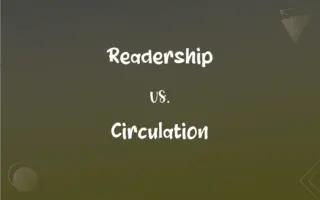After vs. Before: What's the Difference?
Edited by Aimie Carlson || By Harlon Moss || Published on November 26, 2023
After refers to following in time or order. Before indicates preceding in time or order.

Key Differences
After is used to denote a sequence where an event or situation follows another in time, while before indicates that something occurs earlier than a specified point or event.
In terms of order, after is employed when discussing something that comes later in a sequence; conversely, before is used when referring to what comes first.
After can imply a cause-and-effect relationship, suggesting that one event is a consequence of another. In contrast, before may simply denote a temporal sequence without implying causality.
In narratives or storytelling, after is often used to describe subsequent actions or events, while before is used to set the stage or provide background.
In terms of position or location, after can mean 'behind' or 'following,' whereas before often implies 'ahead' or 'in front of.'
ADVERTISEMENT
Comparison Chart
Time Reference
Subsequent to a point in time
Prior to a point in time
Order in Sequence
Following in order
Preceding in order
Narrative Use
Describes subsequent events
Sets earlier context
Causality Implication
Often suggests consequence
Usually indicates precedence without causality
Spatial Relation
Can mean behind or following
Can imply ahead or in front
ADVERTISEMENT
After and Before Definitions
After
In pursuit or search of.
The detective was after the truth.
Before
Confronting or facing.
The challenge before us is daunting.
After
Subsequent in time or order.
She arrived after the meeting had started.
Before
In the presence or consideration of.
He presented his case before the judge.
After
Considering or despite.
After all her efforts, she finally succeeded.
Before
Preferable to or rather than.
I would resign before compromising my principles.
After
In the style of or similar to.
He named his son after his grandfather.
Before
Earlier in time or order.
Finish your homework before dinner.
After
In reference to a name or title.
The park was named after the famous explorer.
Before
In anticipation or expectation of.
She was filled with excitement before her journey.
After
Behind in place or order
Z comes after Y in the alphabet.
Before
Earlier in time
They called me the day before.
After
Next to or lower than in order or importance.
Before
In front; ahead.
FAQs
Do after and before only refer to time?
Primarily, but they can also refer to order, preference, or position.
Is before used to indicate anticipation?
Yes, before can imply anticipation or expectation of something yet to happen.
Can after mean 'in search of'?
Yes, e.g., "The officer is after the suspect."
Can after be used to indicate a name’s inspiration?
Yes, e.g., "Named after a famous artist."
Can after imply a cause-effect relationship?
Yes, after often suggests that something happens as a result of another event.
Can after and before be used in the same sentence?
Yes, they can be used together for contrast, e.g., "Before dawn, but after midnight."
Can after be used in conditional sentences?
Yes, e.g., "After you finish your work, we can go out."
Does after have a spatial meaning?
Yes, it can mean behind or following.
Are after and before interchangeable?
No, they have opposite meanings regarding time and order.
Does after always suggest immediate succession?
Not always; it can indicate any time following an event.
Can before indicate a long time prior?
Yes, before can refer to any time earlier, not just immediately preceding.
Are there idiomatic expressions with after and before?
Yes, both words appear in various idioms, like "after the fact" or "before you know it."
Do after and before have different grammatical roles?
They primarily function as prepositions or conjunctions.
Can before imply a spatial relation?
Yes, it can mean in front of or ahead.
Is before used in warnings or conditions?
Yes, e.g., "Leave before it's too late."
Can after and before be used in a metaphorical sense?
Yes, they can have metaphorical or abstract uses.
Does before ever imply preference?
Yes, e.g., "I'd quit before working overtime."
Can before be used to mean ‘in the presence of’?
Yes, e.g., "He appeared before the committee."
Is after always related to past events?
Not necessarily; it can refer to future events following a certain point.
Can before be used for future events?
Yes, to indicate something happening earlier than a future event.
About Author
Written by
Harlon MossHarlon is a seasoned quality moderator and accomplished content writer for Difference Wiki. An alumnus of the prestigious University of California, he earned his degree in Computer Science. Leveraging his academic background, Harlon brings a meticulous and informed perspective to his work, ensuring content accuracy and excellence.
Edited by
Aimie CarlsonAimie Carlson, holding a master's degree in English literature, is a fervent English language enthusiast. She lends her writing talents to Difference Wiki, a prominent website that specializes in comparisons, offering readers insightful analyses that both captivate and inform.






































































